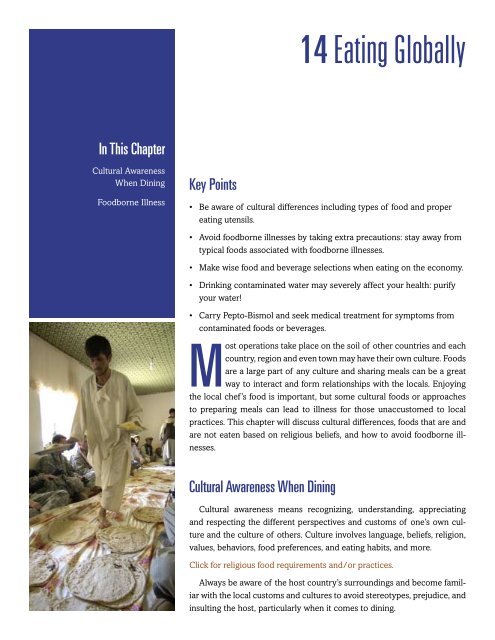special-operations-nutrition-guide
special-operations-nutrition-guide
special-operations-nutrition-guide
You also want an ePaper? Increase the reach of your titles
YUMPU automatically turns print PDFs into web optimized ePapers that Google loves.
14 Eating Globally<br />
In This Chapter<br />
Cultural Awareness<br />
When Dining<br />
Foodborne Illness<br />
Key Points<br />
• Be aware of cultural differences including types of food and proper<br />
eating utensils.<br />
• Avoid foodborne illnesses by taking extra precautions: stay away from<br />
typical foods associated with foodborne illnesses.<br />
• Make wise food and beverage selections when eating on the economy.<br />
• Drinking contaminated water may severely affect your health: purify<br />
your water!<br />
• Carry Pepto-Bismol and seek medical treatment for symptoms from<br />
contaminated foods or beverages.<br />
Most <strong>operations</strong> take place on the soil of other countries and each<br />
country, region and even town may have their own culture. Foods<br />
are a large part of any culture and sharing meals can be a great<br />
way to interact and form relationships with the locals. Enjoying<br />
the local chef’s food is important, but some cultural foods or approaches<br />
to preparing meals can lead to illness for those unaccustomed to local<br />
practices. This chapter will discuss cultural differences, foods that are and<br />
are not eaten based on religious beliefs, and how to avoid foodborne illnesses.<br />
Cultural Awareness When Dining<br />
Cultural awareness means recognizing, understanding, appreciating<br />
and respecting the different perspectives and customs of one’s own culture<br />
and the culture of others. Culture involves language, beliefs, religion,<br />
values, behaviors, food preferences, and eating habits, and more.<br />
Click for religious food requirements and/or practices.<br />
Always be aware of the host country’s surroundings and become familiar<br />
with the local customs and cultures to avoid stereotypes, prejudice, and<br />
insulting the host, particularly when it comes to dining.


